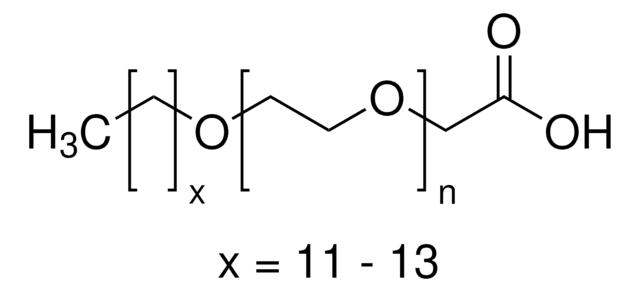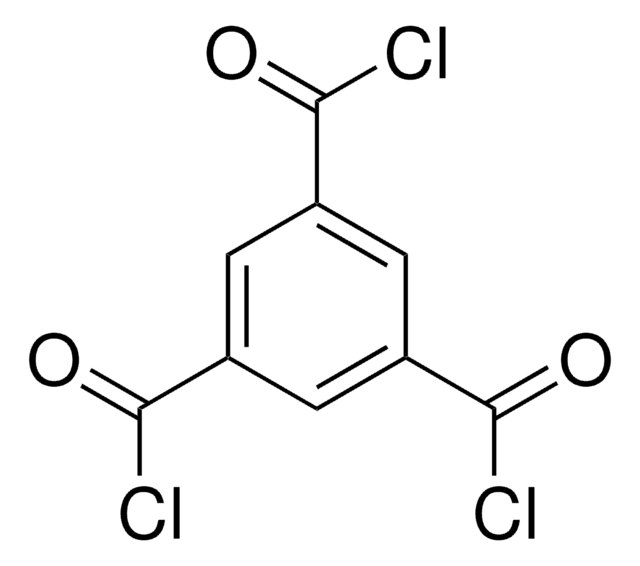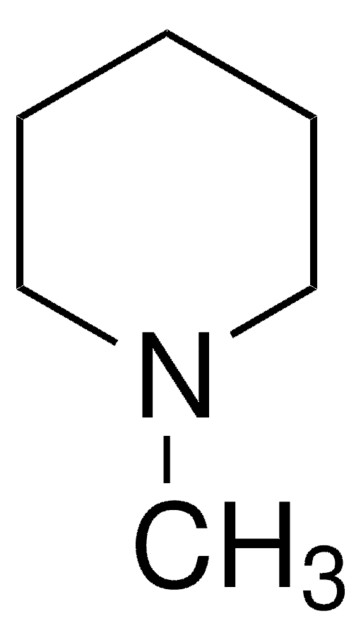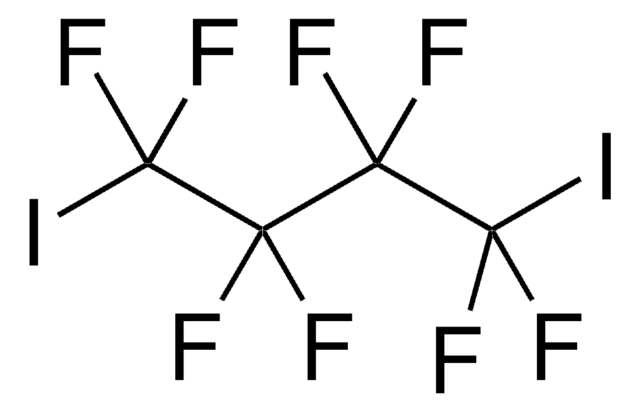473197
Poly(ethylene glycol) 4-nonylphenyl 3-sulfopropyl ether potassium salt
Sinonimo/i:
Polyethylene glycol
Autenticatiper visualizzare i prezzi riservati alla tua organizzazione & contrattuali
About This Item
Prodotti consigliati
Forma fisica
viscous liquid
Indice di rifrazione
n20/D 1.473
P. eboll.
81 °C (lit.)
Densità
1 g/mL at 25 °C (lit.)
Cerchi prodotti simili? Visita Guida al confronto tra prodotti
Categorie correlate
Descrizione generale
Poly(ethylene glycol) 4-nonylphenyl 3-sulfopropyl ether potassium salt is an anionic PEG derivative that can be used as a soft polyoxyethylene sulfonate anion.
Applicazioni
Poly(ethylene glycol) 4-nonylphenyl 3-sulfopropyl ether potassium salt can be used as an anionic surfactant in the fabrication of hierarchical β-Ni(OH)2 microspheres and nickel oxide hollow spheres for supercapacitor applications.
Poly(ethylene glycol) 4-nonylphenyl 3-sulfopropyl ether potassium salt was also demonstrated to be effective for protecting thermostable DNA polymerase during amplification reactions conducted at a temperature ranging from about 40° C to greater than 100° C.
DNA polymerases, such as Taq, do become inactive over time at the high temperatures utilized in thermal cycling reactions such as polymerase chain reaction (PCR). It has been discovered that thermostable DNA polymerases could be protected from such heat inactivation by contacting the polymerase with poly(ethylene glycol) 4-nonylphenyl 3-sulfopropyl ether potassium salt during a thermal cycling process, and improve the specificity of amplification.
Poly(ethylene glycol) 4-nonylphenyl 3-sulfopropyl ether potassium salt was also demonstrated to be effective for protecting thermostable DNA polymerase during amplification reactions conducted at a temperature ranging from about 40° C to greater than 100° C.
DNA polymerases, such as Taq, do become inactive over time at the high temperatures utilized in thermal cycling reactions such as polymerase chain reaction (PCR). It has been discovered that thermostable DNA polymerases could be protected from such heat inactivation by contacting the polymerase with poly(ethylene glycol) 4-nonylphenyl 3-sulfopropyl ether potassium salt during a thermal cycling process, and improve the specificity of amplification.
Stato fisico
~20 EO/mole
Note legali
The composition of this product in combination with thermostable DNA polymerase (including, but not limited to, Taq polymerase) is covered by US Patent No. 7,972,828 and related foreign equivalents. In addition, use of this product may be covered by US Patent No. 8,404,464 and related foreign equivalents.
Codice della classe di stoccaggio
10 - Combustible liquids
Classe di pericolosità dell'acqua (WGK)
WGK 3
Punto d’infiammabilità (°F)
No data available
Punto d’infiammabilità (°C)
No data available
Dispositivi di protezione individuale
Eyeshields, Gloves
Scegli una delle versioni più recenti:
Possiedi già questo prodotto?
I documenti relativi ai prodotti acquistati recentemente sono disponibili nell’Archivio dei documenti.
Fabrication of novel hierarchical beta-Ni (OH) 2 and NiO microspheres via an easy hydrothermal process
Kuang D, et al.
The Journal of Physical Chemistry C, 113(14), 5508-5513 (2009)
Reactive CeO2 nanofluids for UV protective films
Maniglia R, et al.
Journal of Colloid and Interface Science, 506(4), 346-354 (2017)
Solvent-free protein liquids and liquid crystals.
Adam W Perriman et al.
Angewandte Chemie (International ed. in English), 48(34), 6242-6246 (2009-07-16)
Rational synthesis of hierarchically porous NiO hollow spheres and their supercapacitor application
Yan X, et al.
Materials Letters, 95(14), 1-4 (2013)
Functionalized ZnO nanoparticles with liquidlike behavior and their photoluminescence properties
Bourlinos AB, et al.
Small, 2(4), 513-516 (2006)
Il team dei nostri ricercatori vanta grande esperienza in tutte le aree della ricerca quali Life Science, scienza dei materiali, sintesi chimica, cromatografia, discipline analitiche, ecc..
Contatta l'Assistenza Tecnica.![(1S,4S)-(−)-2-Boc-2,5-diazabicyclo[2.2.1]heptane 95%](/deepweb/assets/sigmaaldrich/product/structures/401/063/1eb3be94-6385-4815-8b42-ff76c097cc27/640/1eb3be94-6385-4815-8b42-ff76c097cc27.png)








